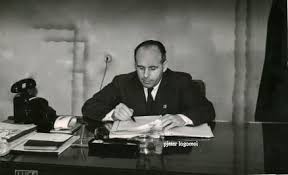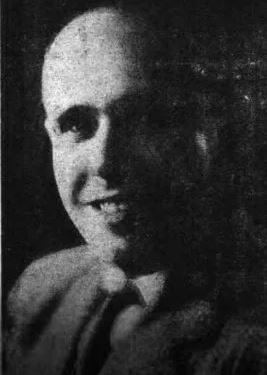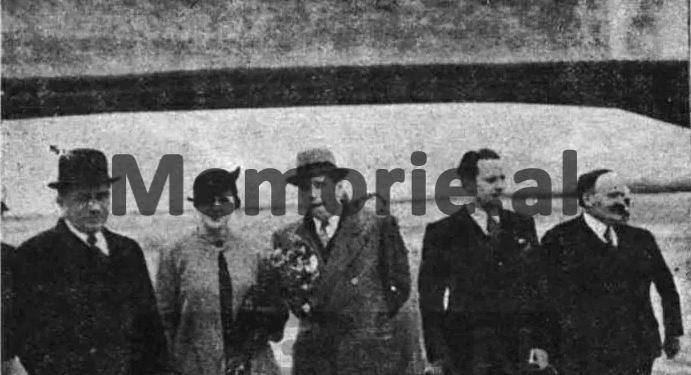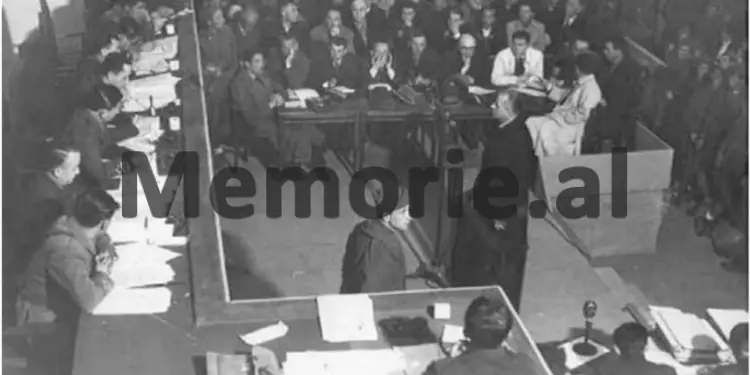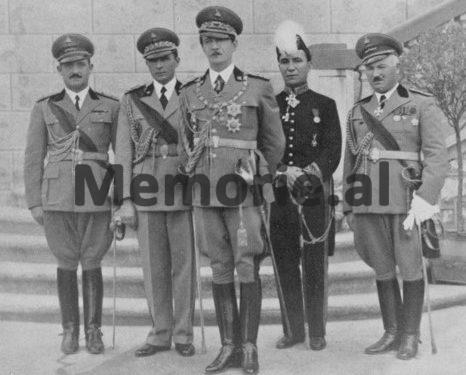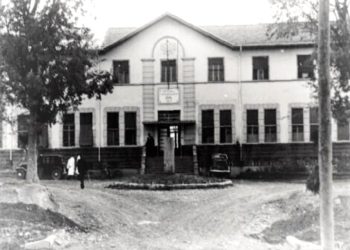Memorie.al / A photo of the magazine “Minerva”, in a report from 1936, when the Kamza bridge was inaugurated, has captured the Minister of World Affairs of that time, Ndoc Naraçi, and his wife, Evelin, side by side. A graceful couple, where, especially the lady, stands out for her style. Equally in love, equally elegant, Maksim Rakipaj describes the Naraçi couple even after almost 30 years from that day, in his book “Survivor”, where he dedicates a section to them titled “Does anyone love like this”?!
It was 1964, at that time Maksi lived with his family in Tresh, Lezha district, and one Sunday, a couple had come to visit them, which immediately took place in the memory of the 13-year-old boy.
“…I looked in amazement at the couple who looked like they came from a time machine trip, in terms of etiquette and politeness in speech and more. Even in combing the hair. In clothing. The way they looked at each other, all love, like newly engaged teenagers…”, writes Maks Rakipaj, for Ndoc and Evelin Naracin.
The presence of these two photographs, one “written with light”, the other with words, makes you think that those 30 years have flowed gently, without shocks or trials for the relationship of this couple, but it was quite the opposite. Between these two times, the Naraçi couple had experienced unthinkable challenges and passed obstacles, where many fell.
He was arrested and tried in the “Special Trial” of 1945, where he was sentenced to 30 years in prison. Evelina was left alone, in a foreign land. And yet she refused to separate from her husband and return to her native country, Austria.
She welcomed Ndoci, who was forgiven part of his sentence and was released from prison, earlier than expected. They settled in Shkodër where they lived for years.It was precisely this period, when they go to visit the house of little Max and with all that they had been through and although, as written in the biography of Ndoc Naraci, “he was released in 1958 and lived in his hometown, in very difficult conditions” they both continued to radiate love and elegance.
This was their victory over the dictatorship, an unofficial victory, recorded only in some memory, but in the end the truths were found there and not in official reports, filled with “enemies of the people” and “party victories”.
From Vienna to Tirana
Ndoci was born in 1899, in a well-known Shkodra family. He received his first lessons at Saverian College. Then, with a scholarship from the Austro-Hungarian government, he went to Vienna, where he first completed a military high school and then higher studies in Electrical Engineering at the Polytechnic University of Vienna, where he graduated in 1926. the salons of Vienna, I met Evelina.
Evelina was married and had two sons, but apparently her feelings for the young Albanian engineer were so strong that she decided to leave her family and join Ndoci in returning to Albania, where they came as a man. The woman. It was Ndoc’s choice to return to his homeland, despite the fact that he was offered residence and settlement in Austria.
It was the choice of many graduates in the West of those years, who thought they would weigh more in their own country, as it happened until the moment when the communist regime was established and they began to be punished one by one.
The career of the young engineer in Albania in the 1920s and 1930s was going great. He started working as an engineer, in the years 1927-1929, in the Ministry of World Affairs of that time, then for 4 years, he continued as a freelancer and during the period 1933-1944, with two interruptions, he was the general director of the Directorate General Office of Post-Telegraphs in Tirana. He was also one of the founders of Radio-Tirana in 1938.
In 1935-1936, he was appointed Minister of World Affairs, while in 1943, Minister of National Economy and substitute Minister of Education, in the first cabinet of Ekrem Libohova. He held the position of Minister of World Affairs for three weeks in 1943. Exactly for this three-week period, as researcher Kastriot Dervishi writes, he would be arrested and tried in the “Special Court”, “for war criminals and enemies of the people”, in 1945.
The punishment that did not stop the love
And why, for a short time, during the German occupation, Ndoc Naraci, was in the post of minister, it cannot be said that he was among the privileged ones of that dark period. On the contrary, it was a period of anxiety for their family, since Evelin was of Jewish origin and this was enough to live under the threat of the Nazi occupation.
However, she, like every other Jew in Albania, had no consequences. Only that, unlike the others, she could not breathe freely, celebrate the departure of the Germans from Albania. A day before the official liberation of Tirana, Ndoci is arrested by the communists.From November 16, 1944 until March 1, 1945, when the “Special Trial” began, he was subjected to the investigation process and after a month or so of court sessions, directed by Lieutenant General Koçi Xoxe, he received the sentence of 30 years of imprisonment freedom.
Maksim Rakipaj writes in his book that Evelina was invited to leave Albania as a foreign citizen, but she refused. Although raised with all the good things in her country and despite the comfortable life she had during her stay in Albania, as the wife of a well-known engineer with important positions, she agreed to submit to ordinary jobs as a laundress.
Knowing 4-5 foreign languages, Evelin also taught languages privately, which would help her to keep herself and her husband in prison. Even more wild was the contrast in the life of Ndoc, who, from being an engineer to a minister, had to work as a laborer in the clearing, for drying the swamps. He also did forced intellectual work, translating Pevsner’s book, “The Double Life of Yevno Azef”, at the behest of the former head of the Internal Branch, Halim Xhelo, who later ended up in prison himself.
He was 59 years old when on July 14, 1958; Ndoc Naraçi came out of prison, weakened by shock, torture, prison camp conditions and hard work. The future, under the regime that had declared him an enemy, was hopeless; however, a light warmed Ndoc’s heart: Evelina, who had waited for him, showing that she would be by his side, even in bad times. The circumstances were so poor that, despite his advanced age, he had to work, even after leaving prison, in draining the swamps.
The hypocrite of the communist regime despised the expertise of an engineer graduated from Vienna and enjoyed putting him to work with a pick and shovel in the swamps, even after he had served his sentence. The couple no longer had a place, not even in Tirana.
They took them to Shkodër, the birthplace of Ndoc, where they lived for years, this third era of their life together, after that in the capitals of Austria and Albania.
So many times and so many changed backgrounds in the pictures of their lives! Only they remained the same. Memorie.al




